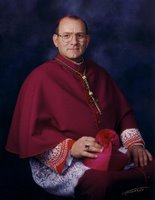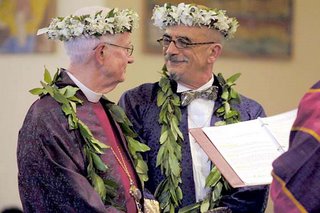 True obedience, whether convenient of not, is not easy
True obedience, whether convenient of not, is not easy7/28/06
by Bishop Robert Vasa
The operative word of the week has been heat. The 100-degree-plus temperatures have made any afternoon activities nearly impossible and have been conducive to naps in the shade. Clearly, this is the situation not only in southern Malheur County, but nationwide as well. In many ways, southern Malheur County is a good place to be when it is this hot, since the July heat seems to fit perfectly well with the desert terrain. In other words, the heat is not unexpected. The situation would be a lot different if one expected moderate temperatures and then encountered these furnace-like conditions.
I have found over the years that the expectations we bring to a situation determine, to a very large extent, the ease or difficulty we experience in coping with that situation. Expecting brutal heat and encountering it makes the bearing of that heat much easier than expecting moderate temperatures and smacking into the wall that is the reality. Expectations, whether about weather or what others ought to do or about how life ought to be or what people will do or how a particular situation will be resolved, determine to a very large extent our immediate emotional reactions.
I believe the same holds true for expectations about Church teachings. When there is an expectation, as held by many people, that some stable and traditional teachings of the Church will change or even that they can change, then there is a lot of room for disillusionment, frustration, anger and distress when those unrealistic expectations are not met. In many ways, the difficulty is not what the Church teaches but the expectation that those teachings should be done away with or that they will change in the future.
I had the opportunity on Saturday to watch some 4-H equestrian events. These were very simple. The youngsters simply had their horses walk, trot or gallop in the circle of the arena both clockwise and counterclockwise.
I discovered that there were a lot of subtle, and some not so subtle, rules that these youngsters needed to learn. First, they needed to stay on the horse if they expected to receive some kind of award. Seems pretty obvious, but how many adults seem to think that they are still in the ecclesial running even if they do not go to church. How the young people held their free hand, whether their legs were too straight or their heels too far in or too far out and how they sat in the saddle were all taken into account in the “judging.”
They were also evaluated on how well they were able to regulate their horses. This meant that the horse, which often has a mind of its own, had a major impact on whether the youngster received an award or not.
One of the things that I clearly do not understand, and I have yet to encounter someone to give me a satisfactory explanation, is the concept of having a horse in the right or left lead. As I understand this, when a horse gallops or runs, it leads with either its right or left front leg. Even though both front legs stretch out at the same time, one leg “leads” the other, and apparently there is a way to instruct the horse which lead to use. In the arena, as I understand it, it is proper for the horse to have one lead while going clockwise and the other lead while going counterclockwise. I honestly do not know what difference it makes to either the horse or the rider — or the judge for that matter — but it is apparently important.
In watching the horses, I thought that some of them understood quite well and almost automatically which lead was proper for the given direction. Others clearly had a preference for one lead or the other and tended to use that lead regardless of the arena direction.
Thus a given horse that tended always to use a left lead appeared to be wonderfully obedient and well trained when he was going in one direction, but his persistence in using that same lead when he was going the opposite direction indicated that he was obedient only when “asked” to do what he was going to do anyway. Then the young rider had to be vigilant about repeatedly instructing the horse about which lead to use.
Again, I thought of Church teaching and how easy it is for each of us to accept some teachings of the Church, not because the Church teaches them, but solely because it happens to be what we personally hold anyway. I would call this convenient obedience. In that instance, we are like the horse with the left lead which undoubtedly felt pretty obedient and “good” when what it was going to do anyway was consistent, at that moment, with what its master was asking.
On the other hand, in those instances when the Church asks us to do or accept something which we may not automatically or emotionally easily embrace, then we need to change or convert or alter our mindset in order to bring ourselves into compliance with those teachings. This is inconvenient obedience; it challenges us.
Unfortunately, if there is an expectation that the Church must, should or will change, then the tendency is to hold on to the erroneous belief or practice and even to do so with a certain degree of self-righteousness. The persistence of some horses in returning to their preferred lead was matched by the persistence of young riders in “asking” their mounts to use the correct lead. I do not expect that the horses’ tendency to choose their own lead will incline the judges to change this evaluative criteria.
It seems to me, and I acknowledge that I clearly lack “horse sense,” that using a right or left lead is rather arbitrary, and yet I do not expect the criteria to change. The Church is relentlessly persistent and consistent in Her teachings, and those teachings, contrary to modern relativistic tendencies, are not arbitrary. Despite the lack of arbitrariness, many are just as relentlessly and consistently recalcitrant in their perception that the Church, and not they, needs to or will change.
Obedience is not an easy thing, but a recognition that it is a loving Lord, a Good Shepherd, who asks and instructs us to abandon our own ways and more fully adopt and accept His ways does make true obedience possible — not only convenient obedience but the “inconvenient” type as well.
Vasa is the bishop of the Diocese of Baker, Oregon. This article appeared originally in the Catholic Sentinel of Oregon.







